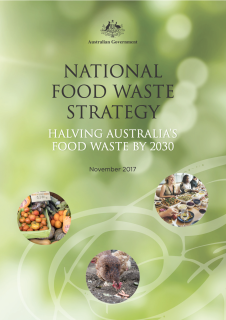Food waste is a global challenge that has environmental, economic and social impacts. It costs the Australian economy about $20 billion a year. To address the challenge in Australia, the government committed in 2016 to convene a food waste summit and develop a national food waste strategy to halve food waste by 2030. This report provides a framework to support collective action towards this goal.
The strategy adopts a circular economy approach to capture food as a resource and to keep those resources in use for as long as possible to minimize negative impacts. It also promotes approaches in accordance with the food waste hierarchy, which favours food waste avoidance over reuse, recycling, reprocessing, energy recovery and disposal. The use of a circular economy approach and the food waste hierarchy demands a strategic and collaborative approach to finding solutions across the entire food supply chain.
The strategy acknowledges that Australia has a highly productive and profitable food and agribusiness industry, a diverse range of hospitality and food service industries, and numerous food rescue charities and community groups that help food insecure Australians.

